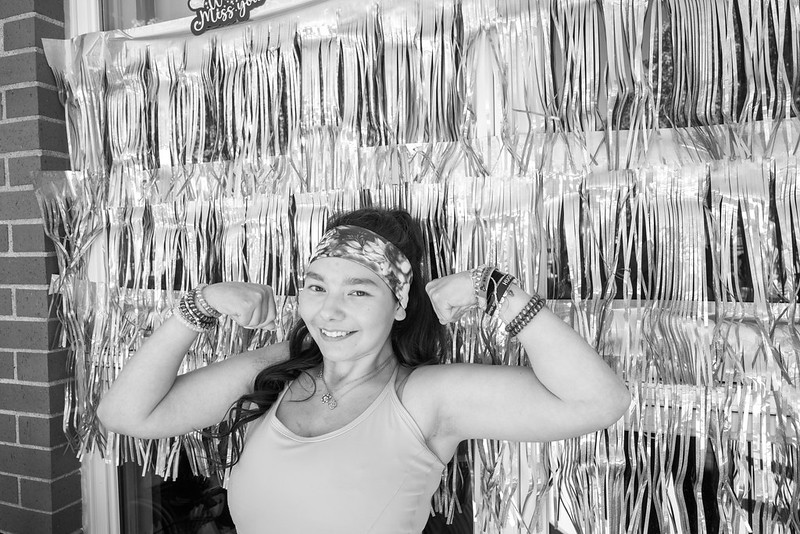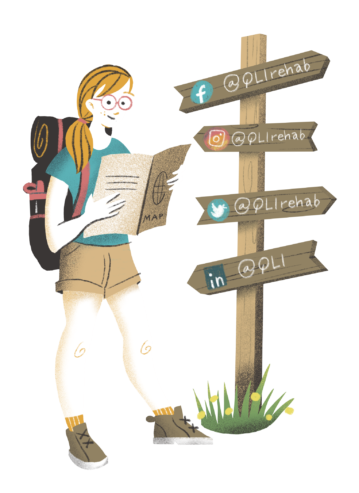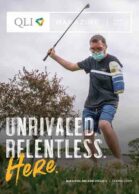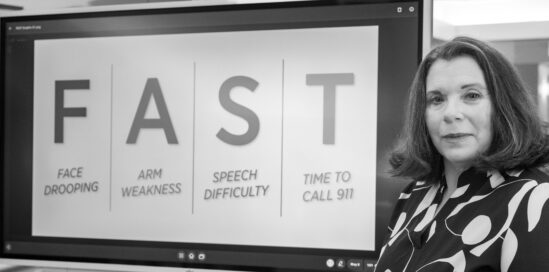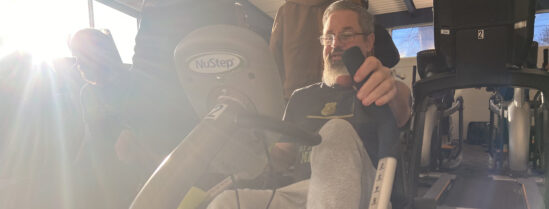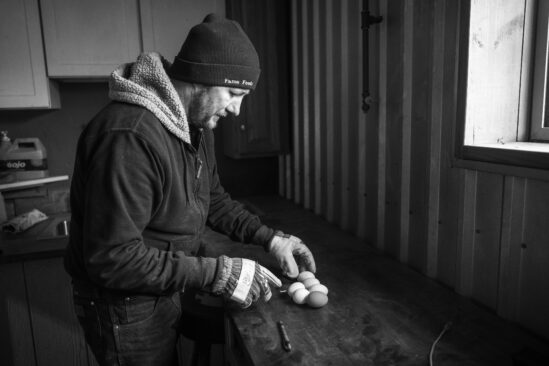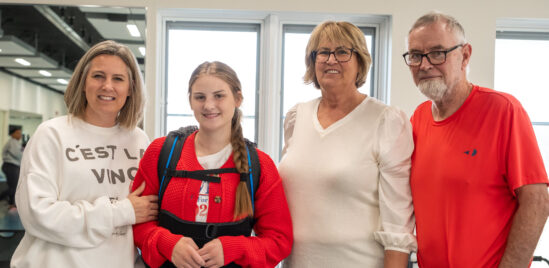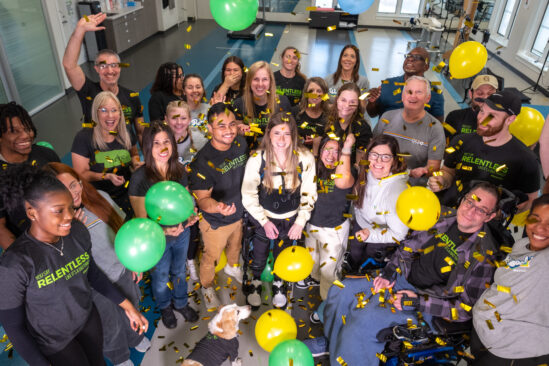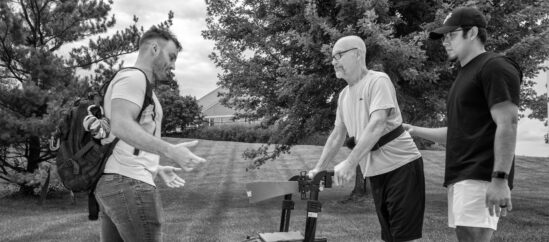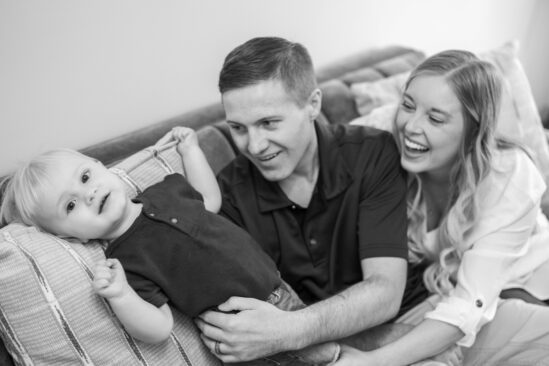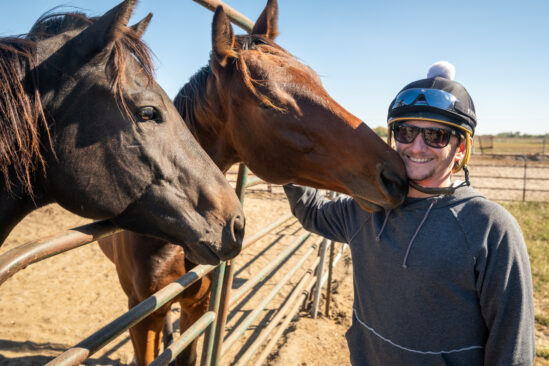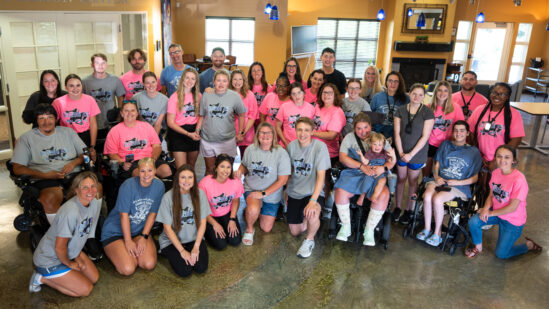On the evening 19-year-old Brooke Bruguier arrived at QLI after months in the hospital, she wanted one thing—Taco Bell. There was one catch—Brooke’s injury inhibited her ability to swallow and put her at risk of choking or aspirating her food. All her nutrition needed to be in pureed form. But that didn’t stop occupational therapist Erin Shuck from answering the call. Beating the clock before it closed, Erin drove to the nearest Taco Bell, bought Brooke some tacos, and pureed them. It may not have been what she envisioned, but the craving was satisfied all the same. It was the beginning of a wonderful relationship.
Just a few months before, it was summer 2023. Brooke had finished her senior year of high school in Flandreau, South Dakota, but still had to complete a handful of courses to receive her diploma. She would spend her summer tying up those loose ends. She doesn’t remember the accident that caused her injury. However, a week before she was set to be discharged from QLI, Brooke reflected on what happened with regret. “I know if I’m ever in that state again,” she says, “I’ll call my mom and get a ride.” To say Brooke was lucky to survive her car accident would be an understatement. Her traumatic brain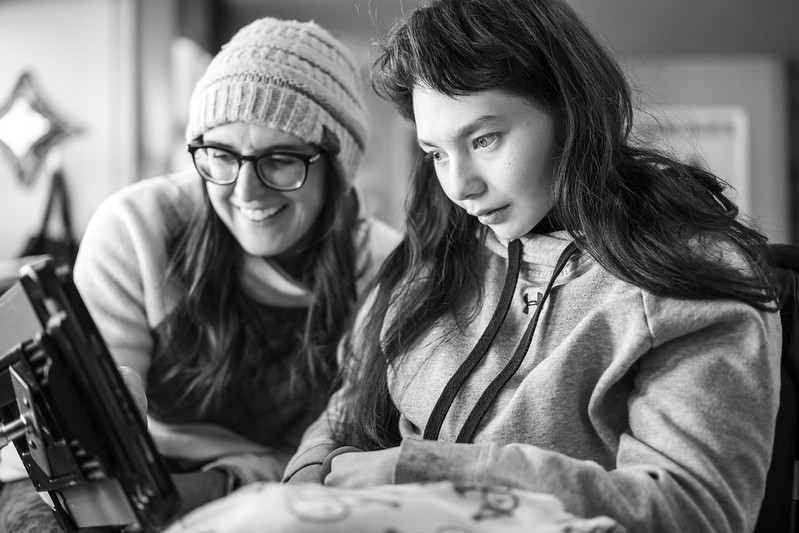 injury was very debilitating and 120 days covered by her insurance can go by in the blink of an eye. The team had to prepare a targeted plan that maximizes the time she has been allowed.
injury was very debilitating and 120 days covered by her insurance can go by in the blink of an eye. The team had to prepare a targeted plan that maximizes the time she has been allowed.
Speaking was difficult for Brooke. If a word did come out it was in the form of an airy and jumbled whisper. She was confused and didn’t fully understand where she was and why. She needed someone to push her in her wheelchair to get around. But personality emanated to Erin and the rest of the team—a quirky and positive attitude, exemplified most in her broad smiles, and frequent thumbs-up. Erin and the team noted the potential that was evident beneath the surface. Still, there was work ahead, building out her rehabilitation program, the days and weeks of pushing forward, when so much was still unknown. “We knew it would be tough,” notes Erin, “but we all wanted to fight for her so badly. It started with 120 days—” Erin pauses, takes a moment, and reflects further. “It’s very emotional to think about,” she says with a smile.
How would the team maximize the 120 days allowed by her insurance? As with every client’s program at QLI, it is ultimately tailored to the individual, and their unique life—what drives them, motivates them, and what they look forward to doing. Brooke is, at her core, a social butterfly, always wanting to connect with others and valuing the time she has with friends or family. Given the significant limitations she presented—her program with speech-language pathologist Taya Tanner started with a mixture of foundational routines and practices with the inherent environment that is particular to QLI.
“We began with developing a communication binder,” says Taya, “with prompts as to the date and where she was, while keywords and phrases were also written down. Her voice was so quiet, and we centered on certain syllables to communicate and found motivating phrases.” The work was simply writing down the words and phrases, keeping them in the binder in the hope that eventually the phrases would click. With Taya, the two would center on a word like “hi” or a phrase such as “How’s it going?” and move syllable by syllable, making sure the mouth shaping of each were optimal for sound production, and that once accomplished they would do it again, cueing for a good and strong vocal volume too. These repetitions provided a critical foundation for Brooke, with the heart of the relationship development with both her residential and clinical teams.
Contextual functional practice, the repetitions therein, and the natural healing that time provided meant that Brooke’s deficits were starting to recede. Taya remembers that Brooke began to understand the feedback of her program, and could finally verbally provide input to her team about what was motivating to her. At the top of that list was reengaging with her friends. The long time spent away from her community might have been devastating for Brooke, had the team not incorporated these goals into her daily routines. Together they planned out methods of texting her friends, or even writing letters to them, moving from the originally rote words and phrases to more complex thoughts. Through intersections with her Life Path Services program, her friends and family came from South Dakota to visit and Brooke planned elements of the itineraries. They would head off campus to grab some coffee or see the sights of Omaha, with Brooke knowing full well that those friendships, the heart of them, never changed.
So what about those 120 days? “The timeline grew as all the pieces for Brooke started to click and fall into place,” remembers house coordinator Brittany Walker. It’s a difficult truth that chance is a significant factor in injury rehabilitation. Insurance coverage may vary greatly and change from report to report. 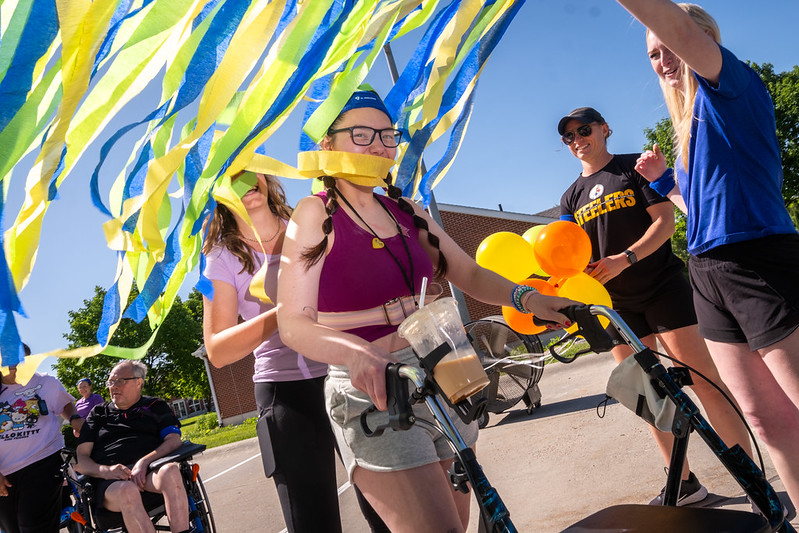 What was once a near-lock and seeming guarantee might end up a denial. The luck simply fell Brooke’s way when it came to getting extensions for her rehabilitation. This allowed Brooke’s team to dedicate essential time in their sessions preparing her inevitable return home with the goal of volunteering at a local coffee shop while completing her high school coursework. Brooke’s future would be undeniably bright.
What was once a near-lock and seeming guarantee might end up a denial. The luck simply fell Brooke’s way when it came to getting extensions for her rehabilitation. This allowed Brooke’s team to dedicate essential time in their sessions preparing her inevitable return home with the goal of volunteering at a local coffee shop while completing her high school coursework. Brooke’s future would be undeniably bright.
The team began planning in early spring 2024. “Her journey and success is a testament to what that time and effort bring about,” says Brittany. With being around friends and family once more came the other equal side of what Brooke wanted, indeed, what just about any young adult wanted—independence. The curve to get to this spot was steep in the beginning. But with that same determination that Erin and others on the team set out to accomplish—so too would this be tackled.
As Brooke’s awareness grew, and the returns of communication started, she bought into every facet of the program. “When we began to have candid conversations,” says Erin, “Brooke was able to tap into constant self-motivation.” That motivation and collaboration with clinicians to thoroughly canvas her morning and evening routines, and by fall 2024 was completely independent in her routines—waking up in the morning, taking her meds, and making a good breakfast before heading out for the day—singularly showing to those on the team simple, straight forward perseverance. “Not many individuals get the opportunity for a year’s worth of rehabilitation,” Erin notes, “and Brooke did not let it pass her by.”
She took it and ran with it.
“You can put in the work at your sessions,” Brooke reflects, “but if you spend your downtime in your room or isolated from other clients or team members, you won’t make progress.” When the change in her progress began, it wasn’t a flip of a switch, but that slow congruence of every aspect of her program, and course, every individual at QLI, from those involved daily in her care or clinical sessions to those who would regularly greet her in the halls of the Lied Life Center, as she returned to ambulating all the time with a rollator walker.
A few days before her discharge trip, Brooke and Taya got together a plan for her farewell party, with walking tacos as the food of choice. Brooke wasn’t just passively involved, but actively planned it out, finding time to go to a store with a team member, get the ingredients, and prepare it for the dozens that showed up to wish her well. Over the months leading up to her discharge, Brooke shone in pride—never missing an opportunity to flex—showing all that she is strong and will not be deterred. And of course, displayed in full at her party. To sum it all up, Brittany gives just one word for Brooke and her journey, “brilliance.” It’s not just the circumstances and surroundings Brooke had while at QLI, but the will within that was revealed over many months—revealing the kind of person Brooke always has been—a certified badass, turning 120 days into a lifetime ahead of progress.
finding time to go to a store with a team member, get the ingredients, and prepare it for the dozens that showed up to wish her well. Over the months leading up to her discharge, Brooke shone in pride—never missing an opportunity to flex—showing all that she is strong and will not be deterred. And of course, displayed in full at her party. To sum it all up, Brittany gives just one word for Brooke and her journey, “brilliance.” It’s not just the circumstances and surroundings Brooke had while at QLI, but the will within that was revealed over many months—revealing the kind of person Brooke always has been—a certified badass, turning 120 days into a lifetime ahead of progress.
